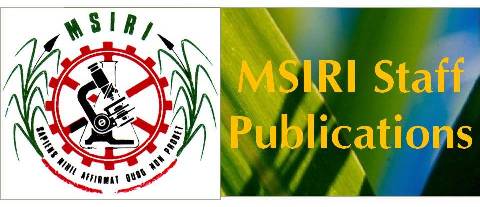Management of the sugar cane soft scale, Pulvinaria iceryi
| MSI11P4574 | |
| Behary Paray, N | |
| Management of the sugar cane soft scale, Pulvinaria iceryi | |
| [Programme and Abstracts] ISSCT 8th Entomology Workshop: Recent advances and new challenges for sugar cane pest management, Mauritius, 28 March-1 April 2011 | |
| ISSCT 8th Entomology Workshop: Recent advances and new challenges for sugar cane pest management, Mauritius, 28 March-1 April 2011 | |
| book chapter | |
| 2011 | |
| [1 p.] | |
| Abstract only | |
| En | |
| En | |
| Localised infestations by the soft scale Pulvinaria iceryi (Homoptera: Coccidae) occur every year leading to significant crop losses in the extreme cases. There is, therefore, a need to develop management strategies that will safeguard the existing natural enemies. The impact of silicon soil amendments on the growth of infested plants of a tolerant (R 570) and a susceptible (M 1400/86) sugar cane variety was assessed under optimal and sub-optimal soil water conditions in a greenhouse trial. Results from this preliminary trial indicated that silicon increased significantly the mean shoot length in the infested plants of R 570 under both water regimes and of the water-stressed susceptible variety. Promising results were obtained as foliar sprays of a silicon product, Orymax, led to 50 per cent mortality of larval stages of the pest. Further studies are, however, needed to understand the impact of silicon on the pest and on the response of the infested plants to the silicon treatments in relation to abiotic factors and environmental stresses.Laboratory bioassays and field trials also demonstrated that non-insecticidal chemicals namely detergent and the botanical insecticide, Vegol, derived fr om oil seed rape are effective on the larval stages. Predation by coccinellid predators is a viable option for the control of the adult stage. Alternate hosts for the predators have been identified to further promote biological control of P. iceryi. The study revealed that an integrated approach using various control strategies could be effective in the management of incipient outbreaks of soft scale in Mauritius to minimize crop losses. Future research work should focus on an understanding of the tritrophic interactions, through chemical ecology work, in order to enhance biological control and to create the appropriate structural and chemical diversity in the sugar cane cropping system. | |
| sugarcane pests insect pests soft scale Pulvinaria iceryi silicon biological control coccinellid beetles chemical ecology | |
| Mauritius | |
| Sugarcane: Pests, pest control and management | |
| Soft scale, Pulvinaria iceryi | |
| 2011-09-12 | |
| En | |
| LIB | |
| CAT | |
| ENTO |
